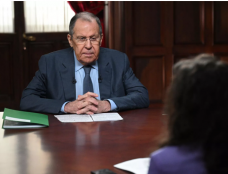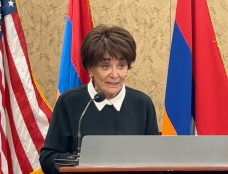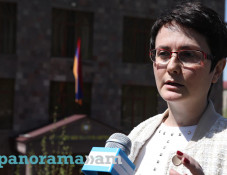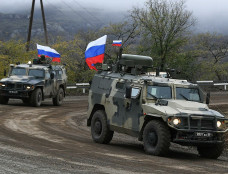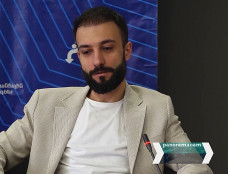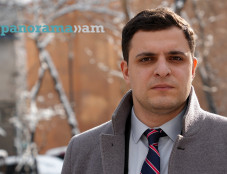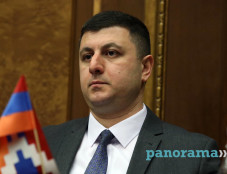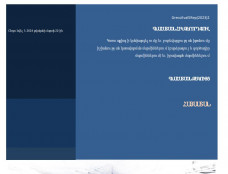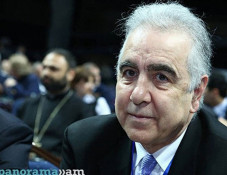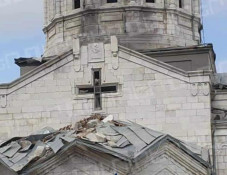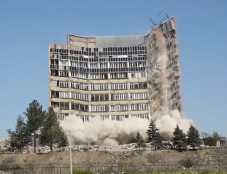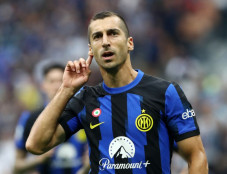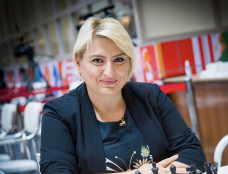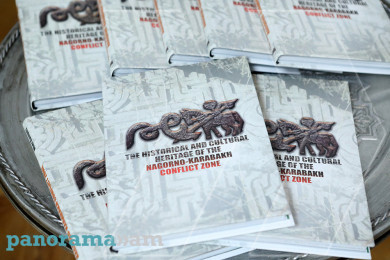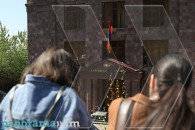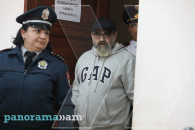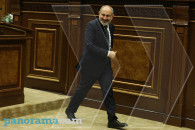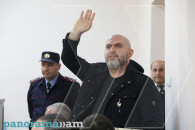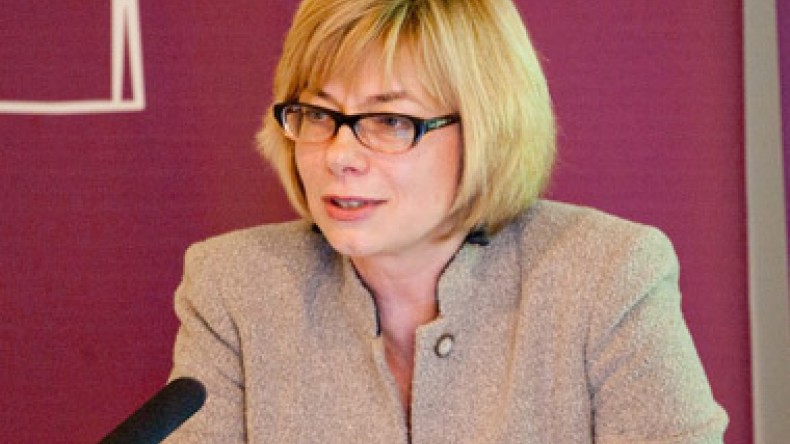
Kataryna Wolczuk: Armenia should be negotiating treaty of Eurasian Union, not only that of Customs Union
Panorama.am presents an interview with Dr. Kataryna Wolczuk, Senior Lecturer in East European Politics at the Centre for Russian and East European Studies, University of Birmingham, UK and the co-editor of the book Eurasian Economic Integration: Law, Policy and Politics (2013).
Dr. Wolczuk says that the EU should continue its cooperation with Armenia as a Customs Union member. She sees the Eurasian integration as a modernizing project which can move its members forward but which has problems with democracy and implementation of rules. She also suggests that Armenia should be negotiating the treaty of the Eurasian Economic Union (and not only that of the CU) in order to have her say in it prior to the creation of the Union in 2015.
N.C: Dr. Wolczuk, you are currently working on a project, which studies the impact that the EU Eastern Partnership Program has had in Armenia. Are there any findings by now that you would like to share?
K. Wolczuk: The project is still in progress, but we already have some findings. In Armenia we have actually seen a lot of progress in terms of the Eastern Partnership program results. Armenia is what we call a “silent success story of Europeanization”. Unlike Georgia, which makes big statements about loving the EU but does not seem so keen on implementing the EU rules, Armenia was much more moderate in its statements, but it did have progress in terms of the implementation of the EU rules as such. We have seen this in a number of sectors and particularly in the sector of food safety, where the situation has improved considerably. However, up until the Vilnius Summit the EU kept it very technocratic, it was all about the export of the basic laws of the EU (the acquis communautaire) with little political debate in the countries. The reason for it was that even though the Eastern Partnership was a very ambitious project it was not such an important policy inside the EU (the 28 EU member states have very different priorities), so not enough attention and resources were devoted to it, and my argument is that it backfired. Then the EU offered this very ambitious comprehensive Association Agreement (AA) which would lock the countries in the EU sphere of governance, turning them into something like shadow members. This would probably be good for them in the long term (8-10 years) but it missed the political realities inside the countries as well as the geopolitical context.
N.C: What problematic issues did you see in the AA as such? Do you think Armenia has lost much by not signing the Association Agreement?
K. Wolczuk: I don’t think Armenia has lost much by not signing the AA, at least not in the immediate term. There were issues with costs and benefits of the AA. With the AA, which included the DCFTA, the countries of the Eastern Neighborhood would get access to the EU single market and comply with all the trade-related regulations. If Armenia wanted to export any agricultural product, it would have to comply with all the standards, which are very high and thus very costly and this is a problem for a country that has a basic living standards issue. The EU works with the motto “do extensive reforms now and in the long term the country will benefit”, but this doesn’t work with the post-Soviet political elites – they have elections now, they want to stay in power now, they have conflict areas now and they are threatened by Russia now. Moldova, for instance, which is the poorest country in Europe, was expected to do all the reforms in the 10 years time. But that is a very long time and those are very expensive reforms, and when there is no EU membership perspective why should the country take such pains? So even without Russia in the backgrounds the EU’s offer would still be problematic. I am actually very critical of the AA as an instrument that the EU used. Of course in the long term if the EU monitored and ensured fair competition in the market, good governance would come with the implementation of the AA; however the EU was not effective in ensuring that the countries in the Eastern Partnership would accept the offer and implement it. With Ukraine I think the EU could have made the offer attractive enough, because Ukraine has no Nagorno-Karabakh issue, which was clearly at stake in the Armenian case. And the EU also adopted this “take it or leave it approach” which put the countries in front of a difficult choice.
N.C: If Armenia becomes a Customs Union member do you think a new framework of cooperation is likely to be established between Armenia and the EU given Armenia’s continued interest to do so or do you think the EU will lose its interest in Armenia as a CU member?
K. Wolczuk: There is actually a lot of rethinking at the moment inside the EU on what went wrong at Vilnius. I think the EU is not going to give up but the whole assistance program was designed for the AA and now they have to revisit it. Actually Armenia has declared for many times that she has a strong interest in continuing the cooperation with the EU; at the Vilnius summit for example there was a very good presentation on Armenia being interested in participating in EU funded projects. So the EU has no excuse, it would simply be unwise for the EU not to find ways of cooperating with Armenia. There are possible softer forms of cooperation. The Armenian authorities have for instance expressed an interest in joining the European energy community, which would be an advanced level of integration in the energy sector. That is one of the ways, and of course another way is also via Eurasian integration. We also have to consider the fact that the institutions in Brussels are changing – we will have a new Commission, a new Parliament and a new Representative for EU Foreign Affairs and then much will depend on the new personality of the EU.
N.C: Dr. Wolczuk, you have also been studying the Eurasian integration project. How would you evaluate it in terms of modernization and progress? We know there is this image of Russia associated with the Soviet past and, so to say, backwardness as opposed to the image of Europe, which is that of progress and future. Do you think the perception that joining the CU is a step backward corresponds to the reality or is it actually going to foster progress and development in Armenia?
K. Wolczuk: In fact we still need time to see how it is developing. As for now I can say that the Eurasian integration is a very ambitious and modernizing project of economic integration, particularly in terms of adoptions of international laws, and it is modeled on the EU. What has been achieved so far with the Eurasian integration project has been very impressive and it shows that Russia is serious about it. The former CIS formula did not work and Russia knows that it has to upgrade its integration project to be perceived as a credible regional leader. Russia has invested its prestige and international reputation, so it cannot allow the Eurasian integration to fail. The competition with the EU in its turn is a strong driving force, too. It is actually paradoxical, because the EU has been promoting regional integration around the world and now that Russia is forming a regional block and the EU does not seem to like it. In any case, the Eurasian integration is a dynamically developing project and I don’t think we will see its quick demise as such.
I must also say that the people working in the Eurasian Economic Commission are real experts, they know the international rules well and they know what they are doing. So there is a serious body which is tasked with promoting the common economic regime and it adopts a lot of norms and regulations corresponding to international standards. We can observe this in different sectors. When it comes for example to the Customs code, this is based on international commitments and the WTO commitments of Russia are directly relevant here. Russia is a WTO member but Belarus and Kazakhstan are not, so they have to implement WTO obligations and this is important for modernization. As a matter of fact the main force of modernization in Belarus is the Eurasian economic integration and not the EU, because the EU is very ineffective.
N.C: So can we say that this is a progressive organization that is actually going to move its members forward rather than backward?
K. Wolczuk: Yes definitely, especially in terms of adoptions of international laws. However, there are two issues related to this notion of backwardness. Political issues like democracy and human rights are left out of the integration agenda, so basically any country with any political system can be accepted into the Eurasian integration project. In that respect one should not expect changes, as there is not going to be any pressure on the political elites to reform their system. But at the same time it has also to be noted that politics and economics in the post-Soviet countries are intertwined – if you do economic reforms, these will also affect the interests of the political elites. So even if the Eurasian integration introduces legal bases in the economic sphere only, it in its turn will bring changes in the political system too; it will make things more transparent and more predictable, but only if it is properly implemented, of course.
N.C: What issues can there be in terms of actual implementation of these rules, given the existing state structures and the interests of the elites?
K. Wolczuk: To me the implementation issue is the biggest and the most challenging issue in the Eurasian integration project. Russia is interested, but in terms of actually being itself a force for modernization of its own political system, it has many problems that do not inspire confidence. The question whether Russia can overcome its own weaknesses and promote modernization and at the same time ensure that the implementation is very high on the agenda (which I am not sure is at the moment).
When the penetration of the rules happens, the issues of compliance and trust are going to be crucial for the functioning of the single market. The authorities in Kazakhstan, Belarus and in Russia for example must accept Armenian companies in the same way as they accept their own domestic companies and must not discriminate against certain business players. But when these rules are implemented in practice, the interests of oligarchs, certain networks and political elites will naturally be affected and this may hinder the implementation if there is no proper rule of law. Actually in all member states this is the weak spot. What all these states need is also functioning domestic institutions, so that they can attract foreign investment, that the business can develop and that the authorities do not take people’s businesses away from them. In fact, given the scale and the ambitiousness of the project, without proper implementation of rules and proper mechanisms of dispute resolution, the whole trust and the whole idea of integration, is going to be questionable.
But because this is such a new project, we actually need another year or two to see to what extent this will work with the existing member states. At this moment my dealing is that not enough attention is devoted to the domestic change within the member states. The Commission relies on the Presidents to deliver the implementation. The EU for instance has been working not only in the vertical but also in the horizontal dimension – with organizations, agencies, competition authorities, etc. Also, the EU has a judicial body monitoring the compliance with the rules and implementation. The European Court of Justice (ECJ) has the mechanisms that allow you to bring to the Court a case against any country that does not comply with the rules and the countries are bound to respect the Court’s decision and the EU law.
N.C: In the Eurasian integration project there is this EEC Court, before which businesses can bring a lawsuit and the rulings of which are binding for the member states. How does it function? How effective can it be in ensuring the implementation of the laws?
K. Wolczuk: So far there have been very few cases brought to the Court but it has been very balanced and very pro-business in its rulings. One example was that it ruled against the Eurasian Economic Commission. But the question is: When it rules against specific countries are those rulings going to be implemented on the domestic level if they run against the interests of the ruling elite or oligarchs?
N.C: Another issue in this regard is the issue of sovereignty. Basically there is going to be a supranational body, the Eurasian Economic Commission, the decisions of which are going to be mandatory for all the member states. To what extent is Armenia actually going to forego its sovereignty?
K. Wolczuk: There are two aspects to it – formal and informal. The regulations of the Eurasian Economic Commission do in fact have a direct effect on the member states within 30 days of their adoption. But they have to be adopted by a higher body and if there is any dispute or objection by any member state, it can be taken to the President, to the higher Eurasian Council. So member states all have a say about what they agree to. Also, decision-making is based on “one country one vote” principle, which is to Russia’s disadvantage. But this is the formal aspect and we have also to consider the informal aspect, i.e. the actual power asymmetries between Russia and other member states. We have seen for instance how Belarus blocked something, but then when it was a matter of bilateral negotiations, Belarus dropped its opposition. So in this regard there is a lot of potential for arm-twisting. On the other hand, we also see signs that the powers of the Eurasian Commission may be slightly reduced, so that the supranational body is not so strong as it initially was, which means that member states will be stronger. Thus the issue of sovereignty is not so clear-cut.
N.C: And how have the questions related to the state Constitution been regulated in Belarus and Kazakhstan when they joined the CU? Have they amended their Constitutions for becoming members of the CU?
K. Wolczuk: No, they changed nothing in their Constitutions. They say there are no implications, but I and my colleague Rilka Dragneva think that there are; we are going to have a closer look into these issues.
But the question with Armenia right now is that it is still not even clear which kind of organization Armenia will be joining – the Customs Union or the Eurasian Economic Union.
N.C: We know that CU is devised as a part of the Eurasian Economic Union – doesn’t this mean that if a country joins the CU it will automatically become also the member of the Eurasian Union once it is created?
K. Wolczuk: No. And that is the problem. The CIS for instance was very selective and flexible – you could be a part of one project but ignore another, while in this case it is not clear. The Eurasian integration is very messy and very complicated legally; it is like a matreshka doll – there is the Eurasian Customs Union, there is the Single Economic Space and then the Eurasian Economic Union, which is in the making and the treaty of which is being negotiated; so the important question is: Is Armenia negotiating the treaty of the Eurasian Economic Union which is planned to be in place in 2015 or only that of the Customs Union? If the Armenian President is serious about joining, Armenia should be negotiating the treaty of the Eurasian Union as well. The earlier you start negotiating the more say you will have in it. Here we have seen Belarus and Kazakhstan blocking things they are not keen on, so Armenia can have a say on what kinds of provisions it wants to adopt. Actually for Belarus and Kazakhstan having Armenia will be very good, because if three member states vis-?-vis Russia disagree on something, three votes vs. one will already make a difference.
Russia basically presents it in a way that the Eurasian integration will allow all the member states to cooperate with the EU as one block rather than individually and from a stronger position, something that Armenia did not have vis-?-vis the EU on bilateral basis. But for example Kazakhstan, which on trade issues at least, should have given up its sovereignty to the Eurasian integration project, said that it did not want to be represented by the Eurasian Economic Commission and on trade issues wanted to negotiate with the EU directly.
N.C: So there is an option to choose, which means that Armenia also can to some extent choose the degree of delegating decision-making powers to the Commission, is that right?
K. Wolczuk: For the time being, yes, but when it comes to the next stage of the project, which starts from 2015, much will have been decided. That is why I am saying if Armenia is serious she has to negotiate the treaty basis of the Eurasian Union now at this stage.
Armenia may want to have her say about specific regulations in the EEU, because once Armenia joins, all the acts which have been adopted so far will affect her too and she will have no choice but to implement them. It is like the accession to the EU – once you are outside when joining the organization you agree to adopt all the acts that have previously been adopted but when you are at the negotiating table from the start you can have a say, you can disagree with what you don’t like. And in the current treaty negotiations there is still an option for the President of Armenia to say “no”.
N.C: Dr. Wolczuk, thank you very much for an interesting and informative discussion.
Interview by Nvard Chalikyan
Newsfeed
Videos





